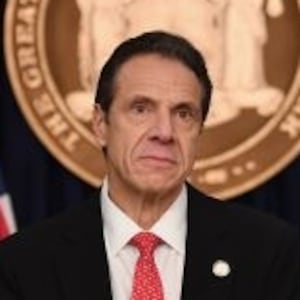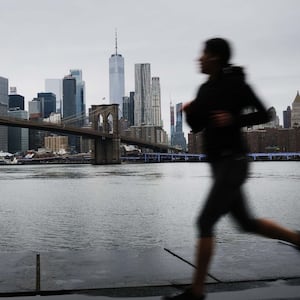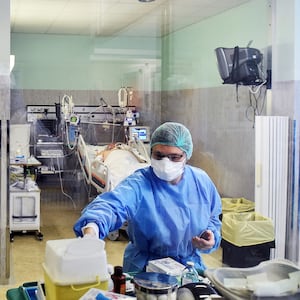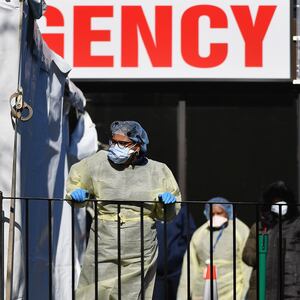New York Gov. Andrew Cuomo on Tuesday acknowledged that the coronavirus is “more dangerous” than officials initially thought after more than 300 died across the state overnight.
“I’m tired of being behind this virus. We’ve been behind this virus from day one,” Cuomo said at a Tuesday press conference in Albany. “We underestimated this virus. It’s more powerful, it’s more dangerous than we expected.”
More than 1,500 people have died and 75,795 more have been infected with the virus in New York State, accounting for a 14 percent increase in the last 24 hours, Cuomo said. About 43,139 of those cases are in New York City, where the daily number of newly infected patients has fortunately dipped below 6,000 across the five boroughs over the last 24 hours.
To date, more than 3,416 people have died and 174,467 individuals have been infected with the virus nationwide—a death toll that has eclipsed China’s official count.
Cuomo said it could be weeks before New York sees the worst of the pandemic, stating that the apex may not be for 21 days.
“We’re all anxious, we’re all tired, we’re all fatigued. It’s been all bad news for a long time. Our whole lifestyle has been disrupted. Everybody wants to know one thing, when will it end. Nobody knows,” Cuomo said. “We’re dealing with a war we’ve never dealt with before. We need a totally different mindset and organizational transformation.”
New York City’s hospitals have been struggling over the last week to keep up with the influx of patients. With over 10,900 residents hospitalized with the virus, including 2,700 patients in ICUs, Cuomo said that the health-care system still needs more supplies, space, and personnel. The state has ordered 17,000 ventilators from China to help hospitals, paying about $25,000 per machine.
“It’s like being on Ebay with 50 other states bidding on a ventilator. How inefficient,” Cuomo said, noting that he only expects to receive about 2,500 machines from China because other states, the federal government, and Italy have also placed orders from the foreign government. “And then FEMA gets involved and FEMA starts bidding. And now FEMA is bidding on top of the 50. So FEMA is driving up the price. What sense does this make?” Cuomo asked.
To further combat the shortage, Cuomo reiterated his Monday plea to health-care workers across the United States for help with the increasing number of infected patients, promising the Empire State would return the favor whenever it’s over the “bell curve.” The governor said that while the state is working to get ahead of the virus, several projections indicate the “main battle at the apex” will occur anywhere between one week and 21 days from now.
“We’re still going up the mountain," Cuomo said, adding that New York is struggling to curtail the surge and “you don’t win by playing catch up.” “The main battle is at the top of the mountain, the apex of the curve.”
So far, government officials have already taken extraordinary steps to combat the pandemic. On Monday, local officials opened the Jacob K. Javits Convention Center as a makeshift, 3,000-bed overflow hospital facility. The same day, a naval hospital ship, the USNS Comfort, arrived in Manhattan to help relieve hospitals of patients not infected with the virus.
The ship, which was previously used as a floating base for rescue workers after 9/11, is currently equipped with 1,000 beds, 12 operating rooms, a medical laboratory, and over 1,000 officers.
Mount Sinai Hospital in New York, in conjunction with a Christian aid organization, also converted a section of Central Park into a field hospital to help house the influx of COVID-19 patients. The tent-hospital, which holds 68 regular hospital beds, along with 10 ICU beds, opened on Tuesday.
Despite the emergency steps that have already been taken, the chair of the department of surgery at Columbia University said Monday the toll of the virus at New York City hospitals is getting so serious that medical professionals could soon be forced to decide who gets treatment—and who doesn’t.
According to Dr. Craig Smith, the apex of the virus will be too overwhelming for the amount of beds currently in New York, forcing doctors and nurses to shift to using a triage method as a “fundamental operating principle in field hospitals.”
“Triage determines who should be treated first, how they should be treated (surgery, fluid resuscitation, etc), and who should be kept comfortable,” Smith said in an update to Columbia faculty and staff about the pandemic response. “Broadly construed, we will all be operating more and more on field hospital principles as we move through the next few weeks.”
NewYork-Presbyterian Hospital, Smith said, will have to “carefully ” select which COVID-19 patients to send home with oxygen, an oxygen saturation monitor, and a strict follow-up system.
“Does this entail incompletely understood risk? It certainly does, but triage is an essential part of the resource/utility-balancing situation in which we find ourselves,” he said.
The devastating effects of the pandemic in New York have rippled from health care to law enforcement.
New York City Police Commissioner Dermont Shea said Tuesday that the virus has greatly affected the city’s law enforcement, as approximately 15 percent of the 37,000-member force has called out sick.
“We have the reserves, we have the contingency plans,” Shea said, stating that while about 5,500 officers are out sick, the NYPD is not extending shifts. He added that 17 NYPD members who tested positive for COVID-19 have since recovered.
Seeming to take a jab at President Donald Trump’s failed prediction that the United States would be able to return to normal life by April 21, Cuomo later emphasized that it is unclear when things in his state will return to normal.
“It is not going to be soon,” he said, urging residents to stay home and stressing there will not be “an Easter surprise.” “So calibrate yourself and your expectations, so you’re not disappointed every morning you get up.”









